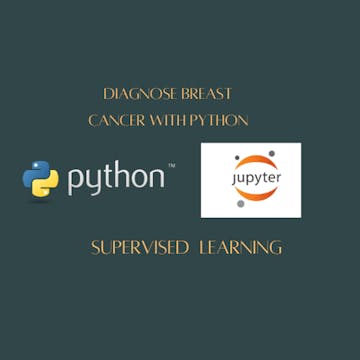
Good to know
Save this course
Reviews summary
Ml for breast cancer diagnostics
Activities
Review Statistical Concepts for Machine Learning
Show steps
Strengthen your foundation by reviewing statistical concepts essential for understanding machine learning algorithms.
Browse courses on
Statistics
Show steps
-
Review key statistical concepts, such as probability distributions and hypothesis testing.
-
Solve practice problems to reinforce your understanding.
-
Identify resources for further learning and reference.
Follow Coursera's Guided Project Tutorials
Show steps
Supplement your learning by following step-by-step tutorials that cover essential aspects of the course.
Browse courses on
Jupyter Notebook
Show steps
-
Identify relevant tutorials from Coursera's online library.
-
Follow the instructions and complete the hands-on exercises.
-
Review the provided materials and explore additional resources.
Organize and Review Course Materials
Show steps
Enhance your retention by compiling, reviewing, and synthesizing course materials.
Show steps
-
Organize notes, assignments, and lecture slides.
-
Review materials regularly to reinforce your understanding.
-
Identify areas where you need further clarification or practice.
Three other activities
Expand to see all activities and additional details
Show all six activities
Solve Practice Problems on LeetCode
Show steps
Reinforce your understanding by solving coding challenges and practicing algorithm implementation.
Browse courses on
Machine Learning Algorithms
Show steps
-
Select problems that align with the concepts covered in the course.
-
Attempt to solve the problems independently.
-
Review solutions and identify areas for improvement.
-
Repeat the process to refine your problem-solving skills.
Build a Machine Learning Model for Breast Cancer Detection
Show steps
Apply your knowledge by creating a practical project that demonstrates your ability to build a machine learning model.
Show steps
-
Gather and prepare a dataset for breast cancer detection.
-
Select and train a machine learning model using appropriate algorithms.
-
Evaluate the performance of your model and fine-tune parameters.
-
Document your project and share your findings.
Participate in Machine Learning Hackathons
Show steps
Challenge yourself and test your skills by participating in hackathons that focus on machine learning applications.
Show steps
-
Identify relevant hackathons and register to participate.
-
Form a team or collaborate with others to tackle the challenge.
-
Develop and implement a machine learning solution.
-
Present your solution and receive feedback.
Review Statistical Concepts for Machine Learning
Show steps
Strengthen your foundation by reviewing statistical concepts essential for understanding machine learning algorithms.
Browse courses on
Statistics
Show steps
- Review key statistical concepts, such as probability distributions and hypothesis testing.
- Solve practice problems to reinforce your understanding.
- Identify resources for further learning and reference.
Follow Coursera's Guided Project Tutorials
Show steps
Supplement your learning by following step-by-step tutorials that cover essential aspects of the course.
Browse courses on
Jupyter Notebook
Show steps
- Identify relevant tutorials from Coursera's online library.
- Follow the instructions and complete the hands-on exercises.
- Review the provided materials and explore additional resources.
Organize and Review Course Materials
Show steps
Enhance your retention by compiling, reviewing, and synthesizing course materials.
Show steps
- Organize notes, assignments, and lecture slides.
- Review materials regularly to reinforce your understanding.
- Identify areas where you need further clarification or practice.
Solve Practice Problems on LeetCode
Show steps
Reinforce your understanding by solving coding challenges and practicing algorithm implementation.
Browse courses on
Machine Learning Algorithms
Show steps
- Select problems that align with the concepts covered in the course.
- Attempt to solve the problems independently.
- Review solutions and identify areas for improvement.
- Repeat the process to refine your problem-solving skills.
Build a Machine Learning Model for Breast Cancer Detection
Show steps
Apply your knowledge by creating a practical project that demonstrates your ability to build a machine learning model.
Show steps
- Gather and prepare a dataset for breast cancer detection.
- Select and train a machine learning model using appropriate algorithms.
- Evaluate the performance of your model and fine-tune parameters.
- Document your project and share your findings.
Participate in Machine Learning Hackathons
Show steps
Challenge yourself and test your skills by participating in hackathons that focus on machine learning applications.
Show steps
- Identify relevant hackathons and register to participate.
- Form a team or collaborate with others to tackle the challenge.
- Develop and implement a machine learning solution.
- Present your solution and receive feedback.
Career center
Machine Learning Engineer
Healthcare Data Analyst
Data Scientist
Medical Physicist
Biostatistician
Cancer Researcher
Medical Imaging Technician
Nurse Practitioner
Radiation Therapist
Health Informatics Specialist
Breast Surgeon
Oncologist
Healthcare Administrator
Public Health Specialist
Epidemiologist
Reading list
Share
Similar courses
OpenCourser helps millions of learners each year. People visit us to learn workspace skills, ace their exams, and nurture their curiosity.
Our extensive catalog contains over 50,000 courses and twice as many books. Browse by search, by topic, or even by career interests. We'll match you to the right resources quickly.
Find this site helpful? Tell a friend about us.
We're supported by our community of learners. When you purchase or subscribe to courses and programs or purchase books, we may earn a commission from our partners.
Your purchases help us maintain our catalog and keep our servers humming without ads.
Thank you for supporting OpenCourser.



